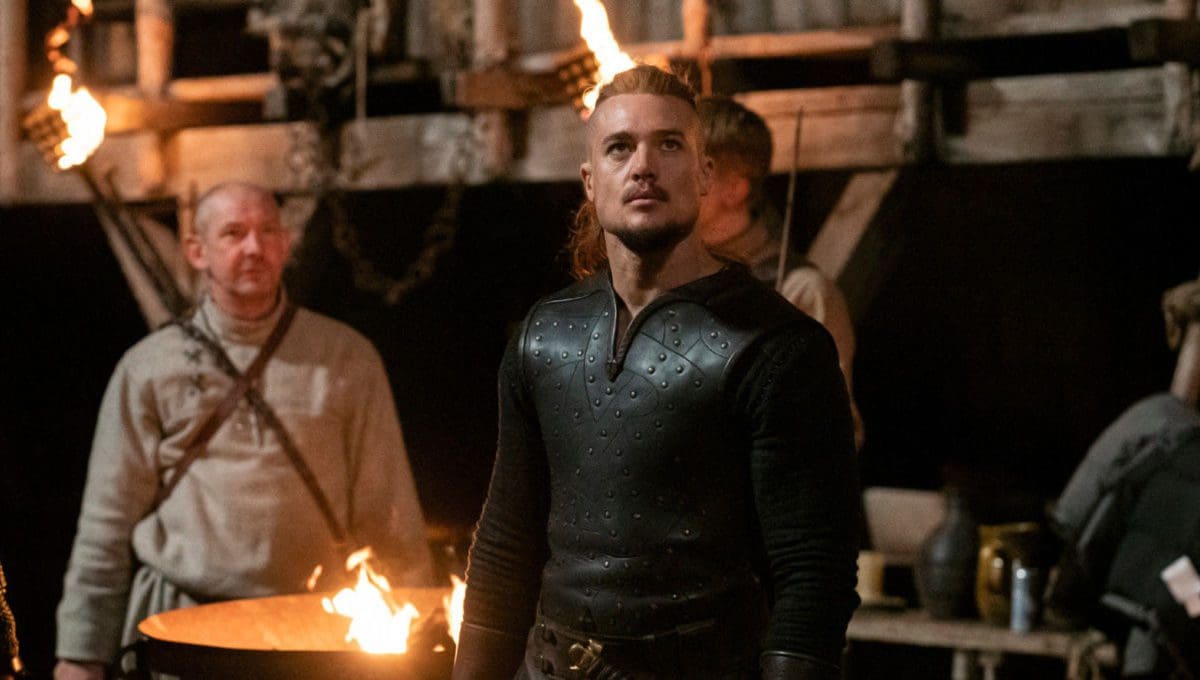
Lost to most in the popularity of Game of Thrones and Vikings was the historical fiction series, The Last Kingdom. Based on The Saxon Stories novels by Bernard Cornwell, the show debuted in 2015 just as the others were at the height of their popularity. Fast forward to Season 4 of The Last Kingdom recently, which was recently added to Netflix, and it remains in full stride, despite a list of major character deaths long enough to make George R.R. Martin salivate.
The fact that more main characters have been killed off than could easily be recalled, along with a somewhat similar time period, and the accompanying swordplay, is where most similarities between The Last Kingdom and Game of Thrones end. It is based on the historical events that chronicle the reign of Alfred the Great and his heirs in their rule of Wessex, but it is infused with the mostly fictional lead character, Uhtred of Bebbanburg (Alexander Dreymon American Horror Story: Coven). Uhtred was born a Saxon but raised by Vikings known as Danes. Ultimately, he desired to reclaim his ancestral home, but in his quest to do so he found himself entangled in constant conflicts between the Saxons and invading Danes.
Over the course of its first three seasons, Uhtred won tremendous victories but also suffered personal losses at every turn. Having fulfilled all perceived obligations to others, he begins this season finally returning to Bebbanburg with those loyal to him, including Father Beocca (Ian Hart, Mary Queen of Scots), to face his uncle Aelfric (Joseph Millson, Angel Has Fallen) who betrayed him years ago. At the same time, a complicated power struggle evolves after Aethelred (Toby Regbo, Reign) overextends his armies causing Aethelflaed (Millie Brady, King Arthur: Legend of the Sword ) and Edward (Timothy Innes, The Favourite) to come to the aid of Mercia, against invading Danes led by Cnut (Magnus Bruun, Gentleman Jack) and Brida (Emily Cox, Fast Forward). The results of this conflict sets in motion a more taxing political one, which drives most of the season.
Expect more of the same from The Last Kingdom in season four. While it might not have the budget of some of its early competitors, it makes the most of what it does have, with brutal and visually captivating battle sequences no matter the scale. The cinematography and sound helps to capture the chaos that had to accompany war at that time, without it being too hard to follow the events. It also continues to have intriguing drama with characters that you care about. Sometimes in a show with this many moving parts, you lose track of things, but The Last Kingdom doesn’t introduce people that won’t have an important role to play. Also, when you aren’t afraid to write a great deal of those important people out of the show, you get to bring new cast-members in that add a fresh element.
Such fresh elements are not in short supply this season. There are plenty of new people, including Uhtred’s disapproving son (Finn Elliot, The Crown), and headstrong daughter (Ruby Hartley), and varying degrees of new villains. The most notable of villains is new a Dane called Sigtryggr (Eysteinn Siguroarson, Devs) who is cunning and has his own method of achieving his goals.
What sets this season apart is the full circle narrative that it allows so many of its characters to achieve, as well as spreading out some of its best dialogue. Aelswith (Eliza Butterworth, DCI Banks), gets to be more than just snide and exhausting, the callous Aethelred is allowed a moment of redemption, Finan (Mark Rowley, Guns Akimbo) gets to deliver some stirring speeches, and Brida loses the last of the audience’s good will towards her, as she demonstrates her transformation into the series’ biggest antagonist.
Obviously in spite of the large cast, Dreymon as Uhtred is the clear force that keeps the show going, much like Travis Fimmel was as Ragnar on Vikings. He’s the most engaging character, portraying someone trying to find their place as a warrior and a romantic lead. You want to see him achieve his ultimate dream. It may take a minute to get used to his accent and slower manner of speaking, but he embodies the show so well that it just wouldn’t work without him at its center.
The Last Kingdom Season 4 was pivotal in determining if it would be able to effectively transition into a new era of the tale of Uhtred, and it quickly doubled down by removing even more familiar elements on which it could have continued to lean. That challenge was well met by the series, as it pushed forward and allowed more people to shine in a season on par with those before it. There are still plenty of unresolved storylines that are begging to be reconciled when it returns, and I certainly can’t wait..

